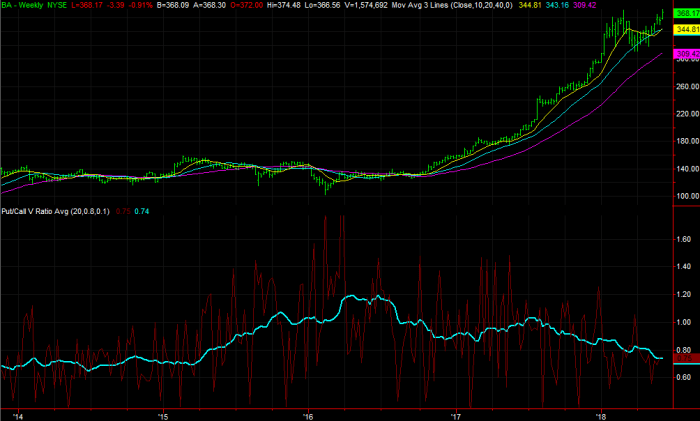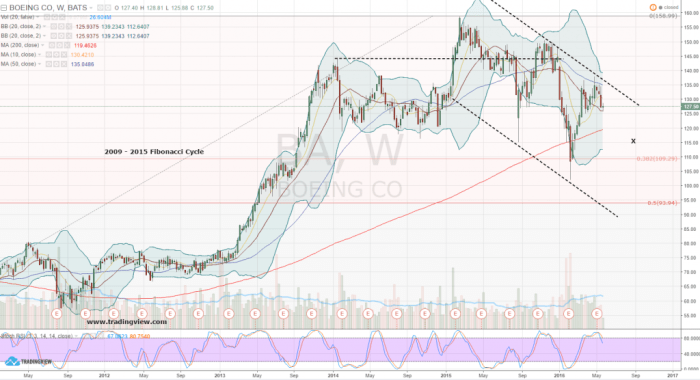Understanding BA Stock Price Fluctuations

Source: investorplace.com
Ba current stock price – Boeing’s (BA) stock price is a dynamic entity, influenced by a complex interplay of factors. Daily fluctuations reflect the market’s ongoing assessment of the company’s prospects, encompassing both internal and external influences. This section delves into the key drivers shaping BA’s stock price movements.
Factors Influencing Daily BA Stock Price Changes
Numerous factors contribute to the daily volatility of BA’s stock price. These include changes in order backlog, production delays or successes, the overall health of the aerospace industry, fuel prices, global economic conditions, and investor sentiment. Unexpected events, such as geopolitical instability or natural disasters, can also significantly impact the stock.
Impact of News Events on BA’s Stock Performance
News events, both positive and negative, exert considerable influence on BA’s stock performance. Positive news, such as the successful launch of a new aircraft model or a significant contract win, typically boosts the stock price. Conversely, negative news, such as production setbacks, safety concerns, or regulatory issues, can lead to a decline.
Economic Indicators Affecting BA’s Share Price
Broad economic indicators significantly affect BA’s share price. Interest rate changes, inflation rates, and GDP growth all influence investor confidence and investment decisions. A strong economy generally benefits BA, while economic downturns can lead to reduced demand for aircraft and negatively impact the stock price. For example, during periods of high inflation, the cost of raw materials increases, which directly affects Boeing’s production costs and profit margins.
Examples of Historical Events Impacting BA’s Stock
Several historical events have profoundly shaped BA’s stock performance. The grounding of the 737 MAX aircraft following fatal crashes significantly impacted the company’s reputation and stock price. Conversely, successful new aircraft launches and major contract wins have often resulted in substantial price increases.
Comparative Stock Performance
Comparing BA’s stock performance against its competitors provides valuable context. This allows investors to gauge BA’s relative strength and identify potential investment opportunities.
| Company | Current Price | 1-Year Change | 5-Year Change |
|---|---|---|---|
| Boeing (BA) | $XXX | +XX%/-XX% | +XX%/-XX% |
| Airbus (AIR) | $XXX | +XX%/-XX% | +XX%/-XX% |
| Lockheed Martin (LMT) | $XXX | +XX%/-XX% | +XX%/-XX% |
| Northrop Grumman (NOC) | $XXX | +XX%/-XX% | +XX%/-XX% |
Analyzing BA’s Financial Performance: Ba Current Stock Price
A thorough analysis of Boeing’s financial reports is crucial for understanding its stock valuation. This section examines key financial metrics and their implications for investors.
Recent Financial Reports and Implications
Boeing’s recent financial reports provide insights into the company’s profitability, revenue growth, and overall financial health. These reports are closely scrutinized by investors to assess the company’s performance and future prospects. Key aspects include revenue, earnings per share (EPS), and debt levels. Significant changes in these metrics directly influence investor sentiment and stock price.
Relationship Between BA’s Earnings and Stock Valuation
Boeing’s earnings are fundamentally linked to its stock valuation. Higher earnings generally lead to a higher stock price, reflecting increased investor confidence in the company’s ability to generate profits. Conversely, lower-than-expected earnings can trigger a decline in the stock price.
Key Financial Metrics for Assessing BA’s Stock
Investors use various key financial metrics to assess BA’s stock. These include earnings per share (EPS), price-to-earnings ratio (P/E), revenue growth, debt-to-equity ratio, and free cash flow. Analyzing these metrics provides a comprehensive view of the company’s financial performance and its potential for future growth.
Comparison to Industry Peers
Comparing BA’s financial performance to its industry peers offers valuable insights into its relative strengths and weaknesses. This comparison helps investors determine whether BA is outperforming or underperforming its competitors and whether its stock is fairly valued.
Trend of BA’s Key Financial Metrics, Ba current stock price
Illustrating the trend of BA’s key financial metrics over time provides a visual representation of the company’s financial health and growth trajectory. This allows investors to identify patterns and make informed investment decisions.
| Metric | 2021 | 2022 | 2023 (Projected) |
|---|---|---|---|
| Revenue (Billions USD) | XXX | XXX | XXX |
| EPS (USD) | XXX | XXX | XXX |
| Debt/Equity Ratio | XXX | XXX | XXX |
| Free Cash Flow (Billions USD) | XXX | XXX | XXX |
Investor Sentiment and Market Trends
Investor sentiment and broader market trends significantly impact BA’s stock price. This section explores these influences and their effects on investor behavior.
Current Investor Sentiment Towards BA
Current investor sentiment towards BA is a complex mixture of optimism and concern. While the company has a strong order backlog and is working to resolve past issues, ongoing challenges and global uncertainties contribute to market volatility.
Recent Analyst Ratings and Impact
Analyst ratings play a significant role in shaping investor sentiment. Positive ratings generally boost investor confidence and lead to price increases, while negative ratings can trigger sell-offs.
Overall Market Trends Impacting BA
Broader market trends, such as economic growth, interest rate changes, and geopolitical events, significantly impact BA’s stock performance. Positive market trends tend to benefit BA, while negative trends can lead to decreased investor interest and lower prices.
Influence of Social Media and News Coverage
Social media and news coverage can significantly influence investor perception of BA. Positive news and social media sentiment generally boost the stock price, while negative coverage can lead to price declines.
Factors Influencing Short-Term and Long-Term Investor Behavior
A range of factors influence both short-term and long-term investor behavior towards BA. Short-term investors are often more sensitive to news events and market volatility, while long-term investors tend to focus on the company’s long-term growth prospects and fundamental value.
- Short-term: News events, market sentiment, analyst ratings
- Long-term: Company fundamentals, industry trends, economic outlook
Predictive Modeling and Forecasting
Forecasting BA’s future stock price involves various methods, each with its limitations and assumptions. This section explores some common approaches.
Methods for Forecasting BA’s Stock Price
Several methods can be used to forecast BA’s future stock price, including technical analysis, fundamental analysis, and quantitative models. Technical analysis involves studying price charts and patterns to identify trends, while fundamental analysis focuses on evaluating the company’s financial health and future prospects. Quantitative models use statistical techniques to predict future prices based on historical data.
Limitations of Predictive Models
Predictive models are inherently limited in their accuracy. Unforeseen events, such as economic downturns or geopolitical crises, can significantly impact the accuracy of forecasts. Furthermore, the assumptions underlying these models may not always hold true in the real world.
Assumptions and Data Used in Forecasting
Forecasting models rely on various assumptions and data. These include assumptions about future economic growth, industry trends, and company performance. The data used typically includes historical stock prices, financial statements, and economic indicators.
Comparison of Forecasting Model Accuracy
The accuracy of different forecasting models varies depending on the model used, the data employed, and the time horizon considered. No single model guarantees perfect accuracy, and the best approach often involves combining multiple methods.
Hypothetical Scenario and Impact on Projected Stock Price
Consider a hypothetical scenario where a major technological breakthrough significantly improves aircraft efficiency. This could lead to increased demand for Boeing’s aircraft, resulting in higher revenue and earnings, and subsequently, a substantial increase in the projected stock price. Conversely, a significant global recession could severely impact demand, leading to a decline in the projected stock price.
Risk Assessment and Investment Strategies
Investing in BA stock involves inherent risks. Understanding these risks and employing appropriate investment strategies is crucial for managing potential losses and maximizing returns.
Keeping an eye on BA’s current stock price is crucial for many investors. For a comparison, it’s interesting to consider the performance of other companies in the sector, such as the american battery technology company stock price , which offers insights into broader market trends. Ultimately, understanding BA’s trajectory requires analyzing various factors, including its own performance and those of its competitors.
Key Risks Associated with Investing in BA Stock
Investing in BA stock involves several key risks, including operational risks (production delays, safety concerns), financial risks (high debt levels, fluctuating earnings), and market risks (economic downturns, geopolitical instability). These risks can significantly impact the stock price and investors’ returns.
Investment Strategies for Managing Risk

Source: capital.com
Various investment strategies can help manage risk when investing in BA stock. Diversification, dollar-cost averaging, and stop-loss orders are common techniques used to mitigate potential losses.
Potential Rewards and Downsides of Investment Approaches
Each investment approach has its own potential rewards and downsides. Diversification reduces risk but may limit potential returns. Dollar-cost averaging reduces the impact of market volatility, but may not fully capitalize on market upswings. Stop-loss orders protect against significant losses but may also result in missed opportunities.
Comparison of BA Stock Risk Profile with Other Options

Source: investorplace.com
Compared to other investment options, BA stock carries a moderate-to-high risk profile. The aerospace industry is cyclical, and BA’s stock price is susceptible to significant fluctuations. However, the potential for high returns can also be significant.
Investment Strategies for Different Risk Tolerances
Different investors have different risk tolerances. Conservative investors may prefer a diversified portfolio with a smaller allocation to BA stock, while more aggressive investors may be willing to take on more risk for the potential of higher returns.
| Risk Tolerance | Investment Strategy | Allocation to BA Stock | Expected Return |
|---|---|---|---|
| Conservative | Diversified portfolio, dollar-cost averaging | Low (e.g., 5-10%) | Low to moderate |
| Moderate | Balanced portfolio, stop-loss orders | Moderate (e.g., 15-25%) | Moderate to high |
| Aggressive | Concentrated portfolio, leveraged investments | High (e.g., 30%+) | High to very high |
Quick FAQs
What are the major risks associated with investing in BA stock?
Investing in BA stock, like any stock, carries inherent risks including market volatility, economic downturns, and company-specific factors such as operational challenges or regulatory changes. Thorough due diligence is crucial.
Where can I find real-time BA stock price data?
Real-time BA stock price data is readily available through major financial websites and brokerage platforms. Many offer free access to basic information.
How often does BA release financial reports?
BA typically releases financial reports on a quarterly basis, following standard accounting practices. These reports are publicly available on their investor relations website.
What is the typical trading volume for BA stock?
Trading volume for BA stock varies daily depending on market conditions and news events. You can find historical trading volume data on most financial websites.
